National Security Committee (Australia)
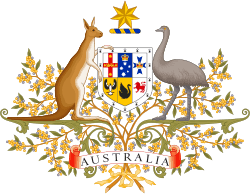 | |
| Committee overview | |
|---|---|
| Formed | 1996 |
| Headquarters | Parliament House, Canberra |
| Committee executive |
|
| Parent department | Department of the Prime Minister and Cabinet |
The National Security Committee of Cabinet (NSC) is the peak decision-making body for national security of the Commonwealth of Australia. It is a committee of the Australian Government Cabinet of Ministers though decisions of the NSC do not require the endorsement of the Cabinet.[1][2][3]
The NSC has similar but not analogous functions as the United States National Security Council and the United Kingdom National Security Council.[4]
History
The origins of the National Security Committee stem from the 1977 tabled recommendations of the Royal Commission on Intelligence and Security, established on 21 August 1974 by Australia's Prime Minister Gough Whitlam and led by Justice Robert Hope, for the creation of a "ministerial committee on intelligence and security to give general oversight and policy control to the intelligence community".[5][6][7]
Prime Minister Malcolm Fraser consequently established the National and International Security Committee in 1977.[8] Prime Minister Bob Hawke also continued the format of the National and International Security Committee as a subcommittee of the Defence and External Relations Committee to consider and report on national security, defence and international relations.[9]
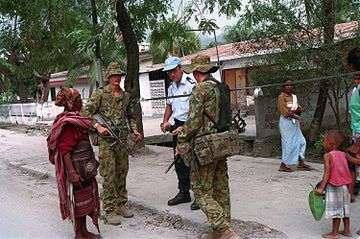
The current format of the National Security Committee of Cabinet was created by Prime Minister John Howard in 1996 with a broad national security mandate including foreign policy and international economic issues. Under Howard the NSC also played a central role in the lead up and during the International Force for East Timor deployment, the formulation of Defence White Papers, and the Australian involvement in the War in Afghanistan and the Australian involvement in the Iraq War.[10]
In 2008, Prime Minister Kevin Rudd revamped the Australian national security framework with the creation of the intergovernmental officials-level National Intelligence Coordination Committee (NICC) and the public service position of National Security Adviser (NSA) within the Department of the Prime Minister and Cabinet. The National Intelligence Coordination Committee plays a central role in advising National Intelligence Priorities and supporting a coordinated approach by the Australian Intelligence Community to directions by the National Security Committee of Cabinet.
The National Security Adviser was created without a statutory footing but was tasked with ranging responsibilities including counterterrorism, emergency management, and defence strategic policy.[11] The role of National Security Adviser was disbanded by Prime Minister Tony Abbott in 2013.[12]
Role
The responsibilities of the National Security Committee include to deliberate and decide on Australia's national security issues, including international security issues of strategic relevance, Australian border security, national responses to domestic and international crises and terrorism, military operations and the deployment of the Australian Defence Force, and the operation and activities of the Australian Intelligence Community.[13]
The NSC also considers issues of defence acquisition and recommendations from the Department of Defence's Capability Acquisition and Sustainment Group.[14]
War powers
The Parliament of Australia is not vested with authority for the declaration of war or the authorisation of military operations. As such the National Security Committee, and ultimately the Prime Minister via the Governor-General of Australia through royal prerogative under Section 68 of the Constitution of Australia, has the power to deploy and use the Australian Defence Force in offensive operations without legislative authorisation. Therefore, the NSC decides on the use of the most extreme powers available to government, including to kill, capture or destroy.[15][16]
As such, the deployment of the Australian Defence Force is decided by the NSC through consultation with the Chief of the Defence Force and the Secretary of Defence and input from the Australian Intelligence Community.[17]
Ministerial Membership
The Prime Minister from time to time determines the membership of NSC. Under the current Morrison Government, the NSC is chaired by the Prime Minister and the membership includes the Deputy Prime Minister, Attorney-General, Treasurer, Minister for Foreign Affairs, Minister for Defence, and the Minister for Home Affairs.[18][19]
| Image | Office Holder | Portfolio |
|---|---|---|
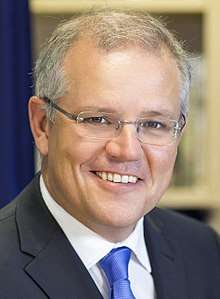 |
The Hon. Scott Morrison MP | Prime Minister (Chairman) |
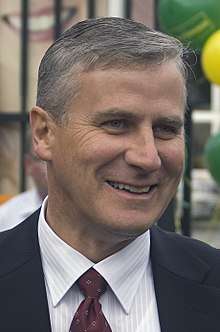 |
The Hon. Michael McCormack MP | Deputy Prime Minister |
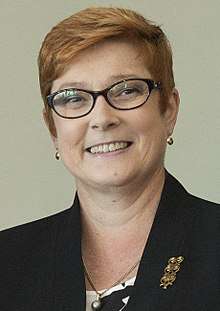 |
Senator the Hon. Marise Payne | Foreign Minister |
 |
The Hon. Josh Frydenberg MP | Treasurer |
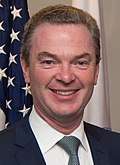 |
The Hon. Christopher Pyne MP | Defence Minister |
 |
The Hon. Peter Dutton MP | Home Affairs Minister |
 |
The Hon. Christian Porter MP | Attorney-General |
Formerly under the Turnbull Government, the ministerial Cabinet Secretary was also a member.[20][21]
Other attendees
Reportedly from October 2015, Prime Minister Malcolm Turnbull elevated the Director-General of Security and the Directors-General of the Office of National Assessments and the Australian Secret Intelligence Service to permanent members of the NSC rather than observers.[22]
As the peak decision-making body on national security, the NSC is also attended and advised by the Secretaries for each respective public service department represented by a Minister on the NSC. As such, NSC attendance also includes the Department of the Prime Minister and Cabinet, the Department of Defence, the Department of Foreign Affairs and Trade, the Department of the Treasury, and the Department of Home Affairs.[23]
The Chief of the Defence Force and other senior ADF officers also attend if requested or required by the NSC.[24]
Other government ministers, such as the Minister for Trade and the Minister for Finance, are invited to attend meetings as required. The Leader of the Opposition of the day is also sometimes invited to attend for important briefings.[25]
Secretaries Committee on National Security
The Secretaries Committee on National Security (SCNS) (formerly the Secretaries Committee on Intelligence and Security) serves as the peak officials-level committee considering national security matters and directly supports the National Security Committee of Cabinet. It is an interdepartmental committee which considers all major matters to be put before the NSC and supports the co-ordination of national security policy across the government.[26][27]
The SCNS membership is composed of the Secretaries for each respective public service department represented by a Minister on the NSC as well as the heads of Australian Intelligence Community agencies and other national security related agencies.[28]
- Secretary of the Department of the Prime Minister and Cabinet
- Secretary of the Department of Defence
- Secretary of the Department of Foreign Affairs and Trade
- Secretary of the Department of the Treasury
- Secretary of the Department of Home Affairs
- Director-General of the Office of National Assessments
- Director-General of Security
- Director-General of the Australian Secret Intelligence Service
- Director of the Defence Intelligence Organisation
- Director of the Australian Geospatial-Intelligence Organisation
- Director of the Australian Signals Directorate
- Chief of the Defence Force
- Commissioner of the Australian Federal Police
- Commissioner of the Australian Border Force
- Chief Executive Officer of the Australian Criminal Intelligence Commission
Secretariat
The National Security and International Policy Group of the Department of the Prime Minister and Cabinet provides secretariat support functions for the NSC and SCNS.[29][30]
See also
References
- ↑ Office of National Assessments Overview of oversight and accountability of the Office of National Assessments
- ↑ Office of the Inspector-General of Intelligence and Security Overview of the Australian Intelligence Community
- ↑ Australian Government Directory Listing of the National Security Committee
- ↑ Australian Strategic Policy Institute The case for an Australian National Security Council
- ↑ Farson, A. S. and Phythian, M. (2001) Commissions of Inquiry and National Security: Comparative Approaches. Santa Barbara, California: ABC-CLIO (page 18)
- ↑ National Archives of Australia Records of the Royal Commission on Intelligence and Security
- ↑ Gyngell, A. and Wesley, M. (2003) Making Australian Foreign Policy. Cambridge, England: Cambridge University Press. (page 146)
- ↑ Gyngell, A. and Wesley, M. (2003) Making Australian Foreign Policy. Cambridge, England: Cambridge University Press. (page 146)
- ↑ Australian Prime Minister Transcripts 16 March 1983 Media Release on Ministerial Committees by Prime Minister Bob Hawke
- ↑ Gyngell, A. and Wesley, M. (2003) Making Australian Foreign Policy. Cambridge, England: Cambridge University Press. (page 107)
- ↑ Lowenthal, M. (2016) Intelligence: From Secrets to Policy. Washington DC: Congressional Quarterly Press.
- ↑ Sydney Morning Herald Tony Abbott dismantles role of national security adviser by stealth, insiders say
- ↑ The Conversation Cabinet's national security committee – an uber group for ministers
- ↑ Institute for Regional Security Strategic Decision-Making: Optimising Australia's National Security Planning and Coordination for 2015
- ↑ Australian Strategic Policy Institute – The Strategist The war powers debate: the Governor-General as Commander-in-Chief
- ↑ The Conversation Australia's war powers and the role of parliament
- ↑ Australian Strategic Policy Institute The case for an Australian National Security Council
- ↑ Australian National Security Overview of roles and responsibilities of Australia's national security agencies and authorities
- ↑ The Conversation Cabinet's national security committee – an uber group for ministers
- ↑ Australian National Security Overview of roles and responsibilities of Australia's national security agencies and authorities
- ↑ The Conversation Cabinet's national security committee – an uber group for ministers
- ↑ "National Security Committee: Spy chiefs to get a seat at the top table" The Daily Telegraph, 21 October 2015
- ↑ Australian Strategic Policy Institute The case for an Australian National Security Council
- ↑ Australian Strategic Policy Institute The case for an Australian National Security Council
- ↑ National Commission of Audit Report National Commission of Audit Report Section on Defence and National Security
- ↑ Office of National Assessments Overview of oversight and accountability of the Office of National Assessments
- ↑ Australian Government Attorney-General's Department Protective Security Policy Framework: Securing Government Business
- ↑ Institute for Regional Security Strategic Decision-Making: Optimising Australia's National Security Planning and Coordination for 2015
- ↑ Institute for Regional Security Strategic Decision-Making: Optimising Australia's National Security Planning and Coordination for 2015
- ↑ Gyngell, A. and Wesley, M. (2003) Making Australian Foreign Policy. Cambridge, England: Cambridge University Press. (page 107)